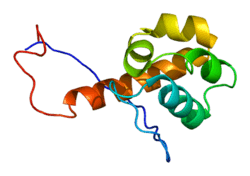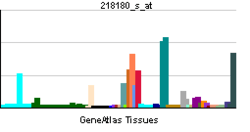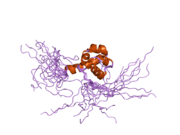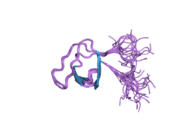EPS8L2
Epidermal growth factor receptor kinase substrate 8-like protein 2 is an enzyme that in humans is encoded by the EPS8L2 gene.[1][2]
This gene encodes a protein that is related to epidermal growth factor receptor pathway substrate 8 (EPS8), a substrate for the epidermal growth factor receptor. The function of this protein is unknown.[2]
References
- ↑ Tocchetti A, Confalonieri S, Scita G, Di Fiore PP, Betsholtz C (Mar 2003). "In silico analysis of the EPS8 gene family: genomic organization, expression profile, and protein structure". Genomics 81 (2): 234–44. doi:10.1016/S0888-7543(03)00002-8. PMID 12620401.
- 1 2 "Entrez Gene: EPS8L2 EPS8-like 2".
Further reading
- Maruyama K, Sugano S (1994). "Oligo-capping: a simple method to replace the cap structure of eukaryotic mRNAs with oligoribonucleotides.". Gene 138 (1-2): 171–4. doi:10.1016/0378-1119(94)90802-8. PMID 8125298.
- Suzuki Y, Yoshitomo-Nakagawa K, Maruyama K; et al. (1997). "Construction and characterization of a full length-enriched and a 5'-end-enriched cDNA library.". Gene 200 (1-2): 149–56. doi:10.1016/S0378-1119(97)00411-3. PMID 9373149.
- Strausberg RL, Feingold EA, Grouse LH; et al. (2003). "Generation and initial analysis of more than 15,000 full-length human and mouse cDNA sequences.". Proc. Natl. Acad. Sci. U.S.A. 99 (26): 16899–903. doi:10.1073/pnas.242603899. PMC 139241. PMID 12477932.
- Offenhäuser N, Borgonovo A, Disanza A; et al. (2004). "The eps8 family of proteins links growth factor stimulation to actin reorganization generating functional redundancy in the Ras/Rac pathway.". Mol. Biol. Cell 15 (1): 91–8. doi:10.1091/mbc.E03-06-0427. PMC 307530. PMID 14565974.
- Ota T, Suzuki Y, Nishikawa T; et al. (2004). "Complete sequencing and characterization of 21,243 full-length human cDNAs.". Nat. Genet. 36 (1): 40–5. doi:10.1038/ng1285. PMID 14702039.
- Gerhard DS, Wagner L, Feingold EA; et al. (2004). "The status, quality, and expansion of the NIH full-length cDNA project: the Mammalian Gene Collection (MGC).". Genome Res. 14 (10B): 2121–7. doi:10.1101/gr.2596504. PMC 528928. PMID 15489334.
- Wan D, Gong Y, Qin W; et al. (2004). "Large-scale cDNA transfection screening for genes related to cancer development and progression.". Proc. Natl. Acad. Sci. U.S.A. 101 (44): 15724–9. doi:10.1073/pnas.0404089101. PMC 524842. PMID 15498874.
- Kim JE, Tannenbaum SR, White FM (2005). "Global phosphoproteome of HT-29 human colon adenocarcinoma cells.". J. Proteome Res. 4 (4): 1339–46. doi:10.1021/pr050048h. PMID 16083285.
| |||||||||||
This article is issued from Wikipedia - version of the Wednesday, May 06, 2015. The text is available under the Creative Commons Attribution/Share Alike but additional terms may apply for the media files.



